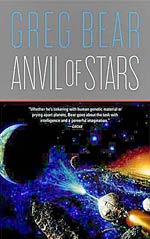
![]() Sable Aradia
Sable Aradia
8/6/2019
![]()
Read for the Space Opera 2019 Challenge.
Wow, what a stunning book!
I was thoroughly enamoured of the prequel to this, The Forge of God. I thought it was a brilliantly written apocalyptic epic, full of twists and turns and intrigue and enough scientific mystery to keep anyone with even a hint of interest in science fiction satisfied. I saw a lot of reviews that said the second book was better, and I scoffed.
I was wrong. This is a work of brilliance that I'm not sure people truly understood at the time. But it sure left an impression on me.
In this novel, the earth has been destroyed by mysterious alien invaders whose motives are unclear. Young people, children, are selected from among the survivors by another mysterious group of aliens that the survivors call the Benefactors. They have sent autonomous ships to help the humans resettle elsewhere in the solar system, and to avenge themselves on the alien culture that destroyed them. There is a pact among other technologically advanced civilizations that any world that is responsible for destroying another world through self-replicating machines must in turn be destroyed. That is the Law.
A Ship of the Law is dispatched to carry these volunteers on a mission to seek and destroy their destroyers. Due to relativistic effects and cryo-sleep that gave the Benefactors time to terraform Venus and Mars, they awaken to the first evidence of their destroyers centuries after Earth's destruction. They are now young adults - late teens and early twenties, about the same age that our soldiers are typically chosen - and must decide how they are going to handle this.
The Children, as they call themselves, have named themselves the Lost Boys and the Wendys. With no real parental guidance since they left on this mission, there are shades of Lord of the Flies in their restructured society. Their leader, regardless of gender, is known as the Pan, and s/he is elected to serve for a period of one Earth year. Martin, the son of the protagonist of the first book, is the current Pan when the book opens.
Ships of the Law provide their crews with the information and technology that is needed to aid in their mission - but no more. They otherwise do not interfere, even when there is conflict, however violent, among their crews.
Martin is faced with deciding whether or not to investigate the evidence that suggests that this star system they have discovered is, in fact, their destroyers, and then deciding whether or not to launch their campaign of retribution. And things do not go well.
A new Pan is elected in the wake of the disaster, and his style of leadership is like night to Martin's day. Martin dithers and tries to gather consensus - not always a good thing in wartime. His successor displays shades of tyranny. Will he do the right thing - or will his desire for vengeance consume him?
It's not the plot itself that is the beauty of this book, the thing that makes it great. It's all the other subtle shades. By eliminating a civilization that has destroyed other civilizations, do you become a force of evil yourself? What if the civilization has forsworn its previous actions? What if its successors had nothing to do with it? What if you can't tell if they're lying or not?
And then there are gems like what happens when one of the Children begins to receive visions:
"The Most High is neither male nor female. It does not blame, it does not judge. It loves, and it gathers..."
This is an almost perfect description of the character of the mechanical beings that inhabit the Ship of the Law, whom they call "the moms." They do not judge - that is for humans to do. They do not interfere. They only provide the tools needed for "the Job."
There is a constant element of distrust with the moms. The crew knows they are not being told everything, not even who the Benefactors are or where they come from. And they suspect that it's because they themselves might become killers as evil as the ones who destroyed their own world. This tension is exacerbated when they encounter another race that also has been victimized by the Killers, as they call them, and the two combine efforts and the resources of their Ships of the Law to achieve their goal. This race has a much better relationship with their ship and their "moms," and in general, seem much kinder and much less violent than we are. Are humans being given the tools to enact justice? Or are they merely being used?
The resolution is poignant and powerful. Bear asks you to question the nature of God, the ethics of war, the structures of society and faith, colonialism, and the vicissitudes of human nature.
As a side bonus, while the technology here seems downright magical, this is in fact hard science fiction. There's sound science behind all of it. I'm taking notes for my fantasy space opera work, and hope to draw inspiration from even a small fragment of it.
It's like a combination of Lord of the Flies, Ender's Game, Babylon 5, Octavia E. Butler's Xenogenesis, and The Forever War all rolled into one, and yet it's entirely its own thing too. If you're at all a fan of space opera or science fiction, I can't recommend it enough.
http://www.dianemorrisonfiction.com